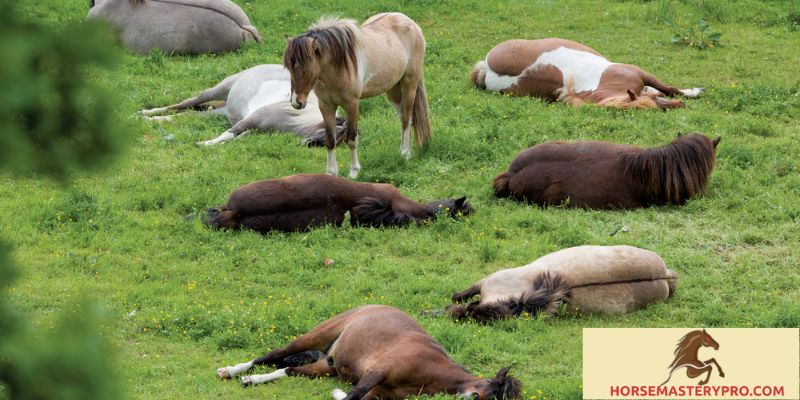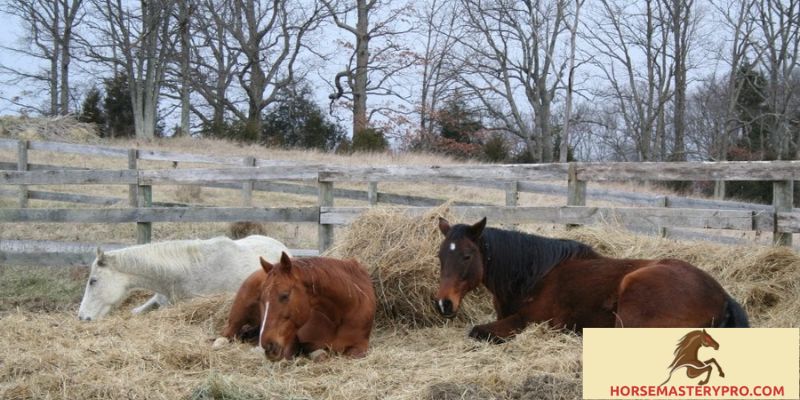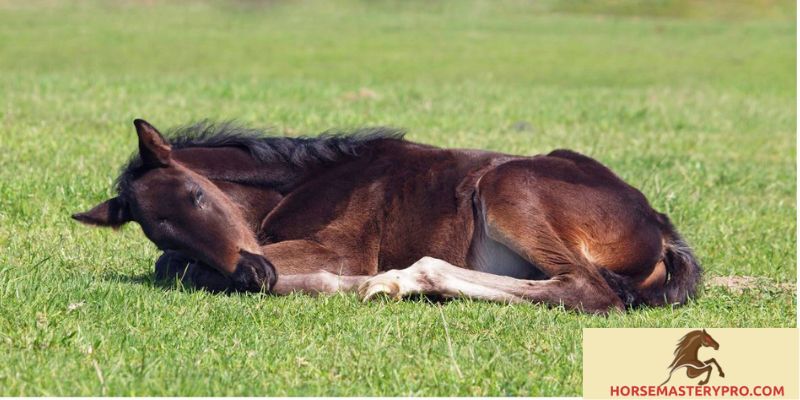Horses are fascinating animals that have captured the attention of humans for centuries. Their unique behaviors and habits never cease to amaze us. One of the most interesting aspects of horses is their sleep behavior. Have you ever wondered how a horse sleeps? Do they dream? How long do they sleep for? In this article, we will delve into the mysteries of horse sleep and explore their sleeping patterns, behavior, and duration.
From their sleeping positions to the cycles of sleep they go through, we will uncover all the intriguing details about horse sleep. Whether you are a horse owner, caretaker, or simply a horse enthusiast, understanding equine sleep behavior is crucial for their overall well-being.
Key Takeaways:
- Horse sleep patterns are unique and different from other animals.
- Horses require deep sleep and REM sleep for their overall health.
- Horses can sleep while standing up, but they prefer to lie down.
- Proper sleeping quarters is important for the relaxation and well-being of horses.
- Observations and research are essential to understand horse sleep patterns and behavior.
Understanding Equine Sleep Patterns
Horses have a unique sleep cycle that differs from humans and many other animals. Unlike humans, horses require only a few hours of deep sleep each night, with most of their rest comprising light sleep and brief periods of wakefulness. This allows horses to remain alert and responsive to their surroundings, even while sleeping.
There are two types of sleep patterns in horses: standing sleep and recumbent sleep. Standing sleep, as the name suggests, involves the horse sleeping while standing up. This is the most common type of sleep in horses, as it allows them to quickly and easily escape from potential predators. Recumbent sleep, on the other hand, occurs when the horse lies down. This type of sleep is deeper and more restful, but it also puts the horse at greater risk of danger from predators or other threats.
Horses nap frequently throughout the day, with most naps lasting only a few minutes each. These microsleeps serve as a way for horses to get the rest they need while still being able to remain alert and aware of their surroundings. It is not uncommon for horses to nap while standing up, either on their own or with the support of a companion horse to help them stay balanced.
The total amount of sleep that horses require each day varies depending on factors such as age, health, and overall activity level. On average, adult horses require between two and four hours of sleep per day, although this can vary widely. Foals, for example, require significantly more sleep each day than adult horses, with some sleeping up to 16 hours per day.
| Horse Sleep Cycles | Horse Rest Patterns | Sleeping in Horses |
|---|---|---|
| Horses have a unique sleep cycle that differs from humans and many other animals. | Horses nap frequently throughout the day, with most naps lasting only a few minutes each. | Standing sleep involves the horse sleeping while standing up. This is the most common type of sleep in horses. |
| There are two types of sleep patterns in horses: standing sleep and recumbent sleep. | These microsleeps serve as a way for horses to get the rest they need while still being able to remain alert and aware of their surroundings. | Recumbent sleep occurs when the horse lies down. This type of sleep is deeper and more restful. |
It is important for horse owners and caretakers to understand the sleep patterns and habits of horses in order to provide them with the adequate rest they need to remain healthy and happy. By providing horses with a safe and comfortable environment to sleep, while also allowing for their natural tendencies to rest and nap, owners can help ensure that their horses remain relaxed and content.
Exploring Horse Sleep Positions and Postures

Horses have specific sleeping positions and postures that they adopt to get a good night’s rest. These positions range from standing to lying down, with each having its unique benefits and drawbacks. In this section, we will explore the different horse sleeping positions, behaviors, and postures.
Horse Sleeping Positions
Horses have two main sleeping positions – standing and lying down. Most horses prefer to sleep while standing, allowing them to rest and remain alert for potential threats. This position is also ideal for horses that sleep in fields. Horses that sleep standing up lock their legs to keep them from collapsing, ensuring they don’t fall over while asleep. However, horses that stand for extended periods may develop sleeping problems and fatigue, which can affect their overall health.
Alternatively, horses can sleep while lying down, which is the most comfortable sleeping position. Lying down allows horses to rest all their muscles and prevents them from collapsing from fatigue. Horses can also dream while they are lying down, just like humans.
Do Horses Sleep Standing Up?
Horses can sleep standing up, but they must lock their legs to prevent them from collapsing. When horses sleep while standing up, they enter a type of sleep that is not as deep as when they are lying down. This position is not recommended for horses that suffer from health issues or those that require deep and uninterrupted sleep.
Horse Sleeping Quarters and Posture
Providing suitable sleeping quarters is essential to ensure horses get a good night’s rest. Horses require adequate space to lie down and roll over while sleeping. A soft and comfortable bedding material, such as straw or shavings, can also help prevent injuries while lying down.
The sleeping posture of a horse is also critical to its overall health. Horses that sleep while standing up for extended periods may suffer from muscle fatigue and other related issues. It’s recommended to provide horses with enough space to lie down, rest, and sleep comfortably. This can help prevent a range of health problems and ensure horses stay healthy and happy.
The Role of REM Sleep in Horses
Horses go through different stages of sleep, with Rapid Eye Movement (REM) sleep being one of them. During this stage, horses exhibit rapid eye movements and muscle atonia, which means their muscles are temporarily paralyzed. This is a natural defense mechanism that allows horses to rest and regain their strength without getting up and moving around.
REM sleep is crucial for horses because it promotes mental and physical well-being. During this phase, the brain processes and consolidates memories, and the body repairs and regenerates tissues. Compared to humans, horses spend less time in REM sleep, but it is still a critical part of their sleep cycle.
Studies have shown that horses require approximately two to three hours of deep sleep each day, which is when they experience the most REM sleep. As such, it is important for horse owners and caretakers to ensure that horses have access to suitable sleeping quarters where they can lie down and rest comfortably.
| Horse Sleep Stages | Description |
|---|---|
| Stage 1 | The horse is drowsy and may be standing or lying down. Its muscles begin to relax, and its heart rate and breathing slow down. |
| Stage 2 | The horse enters a light sleep, characterized by bursts of brain activity. Its muscles continue to relax, and it may sway or twitch. |
| Stage 3 | The horse enters a deeper sleep, and its muscles become even more relaxed. Its heart rate and breathing slow down even further. |
| Stage 4 | The horse reaches its deepest sleep, also known as “slow-wave sleep.” Its brain produces slow, synchronized waves, and it is difficult to wake the horse during this stage. |
| REM Sleep | The horse experiences rapid eye movements and muscle atonia. This is when the brain processes memories and the body repairs tissues. |
Overall, understanding the role of REM sleep in horses is crucial for ensuring their well-being. By providing suitable sleeping quarters and allowing them to rest, horse owners and caretakers can help promote healthy sleep patterns and mental and physical health.
Horse Sleep Needs and Requirements
Sleep is an essential aspect of a horse’s overall health and well-being. Just like humans, horses require a suitable amount of sleep to function correctly. However, the sleep needs and requirements of horses can differ based on various factors, including their age, breed, and environment.
The average horse requires between two to three hours of sleep every day. This sleep time is usually divided into several segments throughout the day and night, with horses taking short naps of 15 to 30 minutes at a time. Horses in the wild may sleep for more extended periods, while those in captivity may be more prone to interrupted sleep due to their living conditions.
Horses in captivity may require a particular sleep schedule to ensure optimal health and well-being. Providing a comfortable and safe sleeping environment, with appropriate bedding and adequate space, can help promote healthy sleep patterns. It’s also essential to ensure that horses have access to food and water throughout the night, reducing any frustration or anxiety that may disturb their sleep.
It’s crucial to note that a lack of sleep can negatively impact a horse’s health. Sleep-deprived horses may develop a weakened immune system, chronic fatigue, or even psychological problems. Therefore, it is essential to prioritize and provide for their sleep needs and requirements.
Observations and Research on Horse Sleep

Observing horses during their sleep has been an essential tool in understanding their sleep behavior. In recent years, equine scientists have conducted various studies to investigate the different aspects of horse sleep. These studies have involved extensive observation, monitoring of behavior, and physiological measurements.
The research conducted on horse sleep has allowed experts to gain a comprehensive understanding of their natural sleep patterns, preferences, and needs. Some of the areas that have been explored through research include resting behavior, sleep cycle, sleep duration, and the effects of sleep deprivation.
Equine scientists have used various tools and methods to study horse sleep. One common approach is to attach sensors to their bodies, allowing for the monitoring of heart rate, brain waves, and other physiological changes during sleep. Researchers have also used video cameras and other tools to observe horses during their sleep in their natural environment or captivity, allowing for a better understanding of their sleep cycles and behavior.
Horse Sleep Research and Science
Equine sleep science is a rapidly growing field, with many studies being conducted worldwide. One study, conducted by researchers from the University of Sydney, used electroencephalography (EEG) measurements to investigate slow-wave sleep in horses. The study found that horses experience less slow-wave sleep during the day than at night and that they exhibit similar sleeping patterns to humans in this regard.
Another study, performed by researchers from the University of Kentucky, analyzed the effects of sleep deprivation on horses. The study found that horses deprived of sleep showed changes in their behavior, including increased aggression, decreased mobility, and decreased performance in cognitive tasks. These findings suggest that sleep is essential for horse health and well-being.
Overall, the research and observations conducted on horse sleep have provided valuable insights into their natural behavior and sleep patterns. This information is essential for horse owners and caretakers to understand, allowing them to provide suitable sleeping quarters and environments and ensure their horses receive the necessary amount of sleep and rest.
Horse Sleep in Different Environments
Horses have unique sleep patterns and habits that can be influenced by their environment. Sleeping at night is a natural behavior for horses, but any disturbances can disrupt their sleep, just like any other animal.
When horses sleep in fields, they may adopt different postures or positions that suit their surroundings. In the wild, horses may sleep standing up to protect themselves from predators, while in captivity, they may prefer to lie down. Studies have shown that horses tend to sleep in short bursts throughout the day and night, as opposed to a continuous sleep period.
Research has also been conducted on the sleep patterns of wild horses and those in captivity. One study found that wild horses slept less during the summer months, while those in captivity slept an average of 5.75 hours per day. Horses in captivity may have different sleep patterns than those in the wild due to differences in their habitat and diet.
Disturbances in the environment can affect horse sleep patterns. For example, loud noises or construction work near a horse’s sleeping area can disrupt their sleep. Studies have also shown that horses in captivity may experience sleep disturbances due to boredom or stress.
It is important to consider the environment in which horses sleep to ensure they can rest peacefully. Providing suitable sleeping quarters, such as a soft and comfortable surface to lie down on, can contribute to their overall well-being. Understanding the different sleep patterns of horses and how their environment can affect them can help horse owners and caretakers care for their animals better.
Conclusion
In conclusion, understanding horse sleep is crucial for their overall relaxation and well-being. Sleep plays a vital role in horses’ physical and mental health, just as it does in humans. Therefore, it is essential to provide horses with a suitable sleeping environment that caters to their natural sleeping patterns and requirements.
As we have seen, horses have unique sleep patterns and postures, making it important to observe their behavior and conduct research into their sleep. This research can help improve their sleep health and provide insights into how we can better manage and care for them.
Whether horses are in captivity or the wild, their sleep is influenced by various factors such as the environment, potential disturbances, and their natural tendencies. Thus, it is essential to consider these factors and ensure they are met to maintain optimal sleep health.
Horse sleep and relaxation
Proper sleep is essential for horses to relax, unwind, and recharge. Just like humans, horses require deep sleep and REM sleep to maintain optimal health. Therefore, providing a stress-free sleeping environment is crucial for their overall relaxation and well-being.
Horse sleep and well-being
Horses’ sleep health has a direct impact on their overall well-being. A lack of sleep can affect their immune system, mental health, and physical recovery. Therefore, ensuring horses have access to adequate sleep is essential for their long-term health and happiness.
In conclusion, prioritizing horse sleep in their care and management is crucial for their overall health and well-being. By understanding their unique sleep patterns and requirements, we can ensure they have a suitable sleeping environment that caters to their natural tendencies and provides them with the necessary rest they need to thrive.


